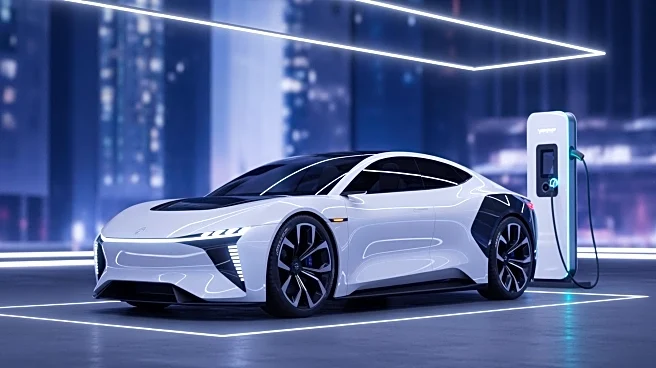What's Happening?
General Motors (GM) is planning to introduce a family of affordable electric vehicles (EVs) following the revival of the Bolt, which is priced under $30,000. This initiative is part of GM's strategy to compete
with low-cost EVs from China. GM President Mark Reuss emphasized the company's focus on internal research and development to improve its Ultium platform and explore new battery technologies, such as lithium manganese-rich (LMR) batteries. The first LMR-based EV model is expected to be released in 2028 in collaboration with LG. Meanwhile, Tesla is taking a different approach by focusing on the Cybercab, a vehicle optimized for full autonomy without a steering wheel, set to begin production in the second quarter of next year.
Why It's Important?
The competition between GM and Tesla highlights the evolving landscape of the EV market in the United States. GM's focus on affordable EVs could make electric vehicles more accessible to a broader audience, potentially increasing market penetration and accelerating the transition to sustainable transportation. On the other hand, Tesla's emphasis on autonomous vehicles with the Cybercab represents a significant shift towards self-driving technology, which could redefine personal and shared transportation. The outcome of this competition could influence the direction of the automotive industry, impacting manufacturers, consumers, and regulatory frameworks.
What's Next?
GM's strategy to develop a family of affordable EVs could lead to increased competition in the low-cost segment, prompting other automakers to follow suit. Tesla's focus on the Cybercab may drive advancements in autonomous vehicle technology and regulatory discussions around self-driving cars. The success of these initiatives will depend on consumer acceptance, technological advancements, and regulatory support. Both companies' strategies will likely shape the future of the automotive industry and influence global trends in electric and autonomous vehicles.
Beyond the Headlines
The differing strategies of GM and Tesla reflect broader trends in the automotive industry, such as the push for sustainability and the integration of advanced technologies. GM's approach may lead to increased job opportunities in manufacturing and R&D, while Tesla's focus on autonomy could raise ethical and safety concerns regarding self-driving technology. The competition also underscores the importance of innovation and adaptability in a rapidly changing market.










